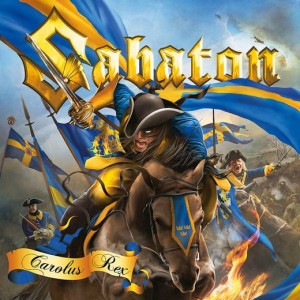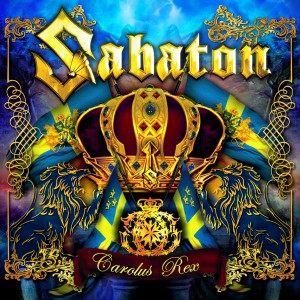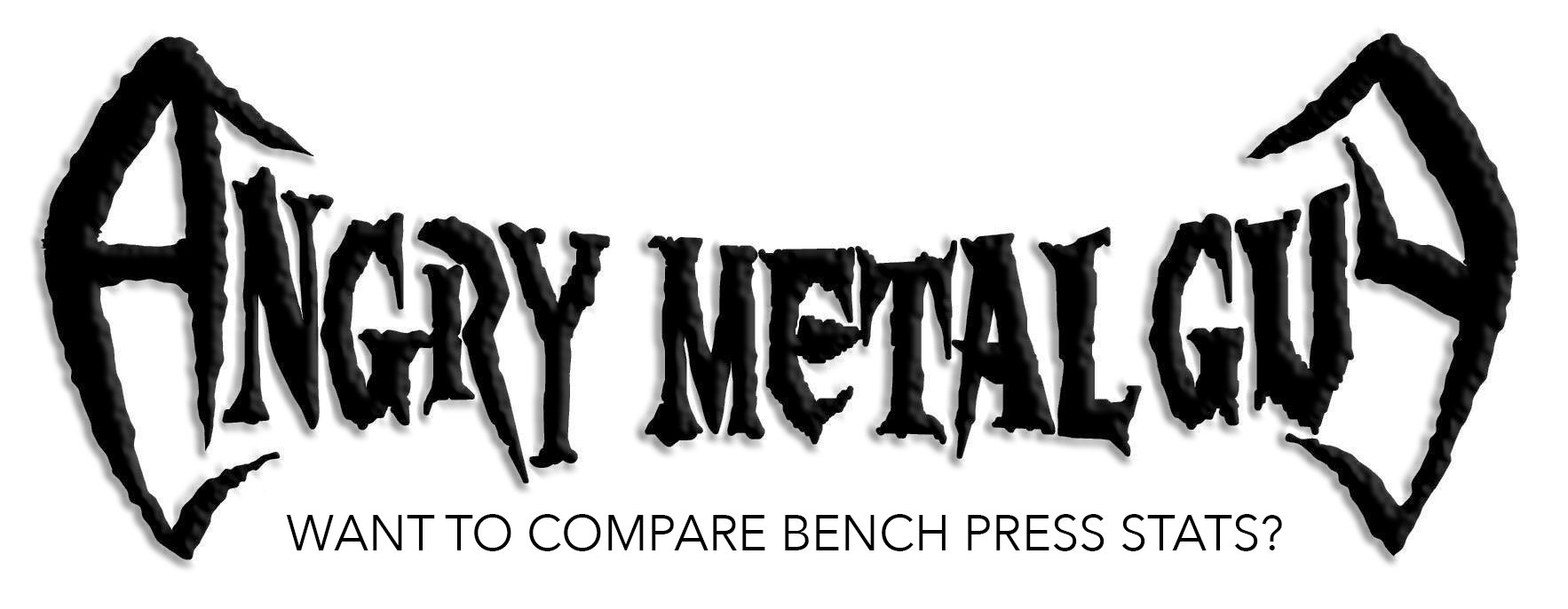Sabaton // Carolus Rex
Rating: 4.5/5.0 — Triumphant (till skillnad från Karl XII)
Label: Nuclear Blast [EU | US]
Websites: sabaton.net | facebook.com/sabaton
Release Dates: US: 05.22.2012 | SE: 2012.05.23 | EU: 2012.05.24/28
 When I first heard that Sabaton was working on Carolus Rex I have to say that I was kind of excited. We’ve all heard a lot about medieval Scandinavia because of the folk and viking metal movements, but early-modern Sweden, which is Sweden’s only period of military might—the so called Great Power period of Swedish history (Stormaktstiden)—is something probably seems insanely foreign to most people thinking of Sweden as the home of ABBA, Pippi Longstocking and a policy of neutrality that kept Sweden out of the greatest wars of the 20th century. In fact, Sweden has not been to war—aside from peacekeeping missions they now engage in—since 1814. Norway got its independence from the country without a bullet fired in 1905, and since then the country has turned into what it is today. All of that said, despite being so long ago, Stormaktstiden is a bit of a touchy subject for Swedes. Swedes generally feel uncomfortable with the use of Karl XII (also known as Charles XII or by his latinized name Carolus Rex) and the Swedish flag because they have been associated with nationalistic movements, neo-nazis and anti-immigration sentiments. So I was very curious to see how these Falun-based Swedish power metallers would thread this needle between writing something interesting and historically unique in the world of heavy metal, while simultaneously being cautious about subject.
When I first heard that Sabaton was working on Carolus Rex I have to say that I was kind of excited. We’ve all heard a lot about medieval Scandinavia because of the folk and viking metal movements, but early-modern Sweden, which is Sweden’s only period of military might—the so called Great Power period of Swedish history (Stormaktstiden)—is something probably seems insanely foreign to most people thinking of Sweden as the home of ABBA, Pippi Longstocking and a policy of neutrality that kept Sweden out of the greatest wars of the 20th century. In fact, Sweden has not been to war—aside from peacekeeping missions they now engage in—since 1814. Norway got its independence from the country without a bullet fired in 1905, and since then the country has turned into what it is today. All of that said, despite being so long ago, Stormaktstiden is a bit of a touchy subject for Swedes. Swedes generally feel uncomfortable with the use of Karl XII (also known as Charles XII or by his latinized name Carolus Rex) and the Swedish flag because they have been associated with nationalistic movements, neo-nazis and anti-immigration sentiments. So I was very curious to see how these Falun-based Swedish power metallers would thread this needle between writing something interesting and historically unique in the world of heavy metal, while simultaneously being cautious about subject.
Let’s skip the subject matter for a while and just talk about the music. Compared to everything I’ve ever heard by this band, I think that Carolus Rex is easiest the band’s most inspired record ever. The songs are pummeling power metal, laced with choirs and keyboard orchestras that move at a million miles a second most of the time, but drop into crushing groove that is entirely too addictive. That is to say, this isn’t something you haven’t heard before. A fan of Blind Guardian? Falconer? Nocturnal Rites? You know the drill. But Sabaton’s trick is vocalist Joakim Brodén’s baritone, which is the first thing that separates the band from the others. His performance is slightly raw at times, but he isn’t your classic wailer and it gives Sabaton the balls that a band like Stratovarius has never been able to muster.
On a compositional note, Carolus Rex is actually quite impressive, which isn’t something this Angry Metal Guy has previously thought about Sabaton’s material. While not wandering outside the realms of orchestral or classic power metal, the record is chalk full of super catchy melodies and harmonies. While songs like “Gott Mit Uns” (that’s German “God with Us”—think Thirty Years’ War) and “1 6 4 8” are really just cookie cutter meanderings into power metal, the superiority of the melodic constructions, choruses and bridges differentiate this band from the common chattle. But the stuff that really gets me excited, is when the bands break out into the kind of melodic, groovy and rhythmic use of choirs and keys like they do in “1 6 4 8” or “Karolinens Bön” (“The Carolean’s Prayer). This shows a kind of musical sophistication that I never would have accused the band of previously. And the quality of the musicianship shows up throughout the album, the guitar-work of the now-departed leads Rickard Sundén and Oskar Montelius is fantastic, with some memorable leads but never really taking up too much space. Bassist Sundström and now-departed drummer Daniel Mullback also work together well, holding down the low end of these records but never seriously showing off.
 But, of course, the primary focus of this record is still the concept. The album tells the story—though I don’t have the lyrics so this is a bit of an assumption of places—of the rise and fall of the Swedish imperial period. Starting with Gustavus Adolphus (Gustav II Adolf) who was known as the Lion of the North (“Lejonet från Norden” / “The Lion from the North”) and moving through the end of the Thirty Years’ War in 1648 (“1 6 4 8”). While all these songs are great, one of the highlights of this section is the remarkably anthemic “En Livstid i Krig” (“A Lifetime of War”). Then the focus shifts towards the rise of the next royal house, using specifically the Caroleans (Karolinerna) who were the elite fighting unit of Karl XI and Karl XII. After the young and inexperienced King had brought all of the enemies to knee but the Russians after the start of the Great Northern War, he and the Caroleans were routed at Poltava in 1709 after the Russians used scorched earth tactics to starve them out (Karl XII apparently never heard the wisest of all sayings—“Never fight a land-war in Asia”). On “Kungens Likfärd” (“Long Live the King”) they deal with Karl’s untimely death as he tried to take back Norway from the Danish king, with the goal to take it back before turning his forces back to deal with Russia. At this point the Great Power period of Swedish history is done, “never to return” (“aldrig återvänder” from “Ruina Imperii”). In fact, for those interested, the period that followed is also fascinating. For half a century Sweden had a parliamentary rule which was unique to the world, one assumes as a strong reaction to the Karl XII’s militaristic adventurism which brought the empire to ruin.
But, of course, the primary focus of this record is still the concept. The album tells the story—though I don’t have the lyrics so this is a bit of an assumption of places—of the rise and fall of the Swedish imperial period. Starting with Gustavus Adolphus (Gustav II Adolf) who was known as the Lion of the North (“Lejonet från Norden” / “The Lion from the North”) and moving through the end of the Thirty Years’ War in 1648 (“1 6 4 8”). While all these songs are great, one of the highlights of this section is the remarkably anthemic “En Livstid i Krig” (“A Lifetime of War”). Then the focus shifts towards the rise of the next royal house, using specifically the Caroleans (Karolinerna) who were the elite fighting unit of Karl XI and Karl XII. After the young and inexperienced King had brought all of the enemies to knee but the Russians after the start of the Great Northern War, he and the Caroleans were routed at Poltava in 1709 after the Russians used scorched earth tactics to starve them out (Karl XII apparently never heard the wisest of all sayings—“Never fight a land-war in Asia”). On “Kungens Likfärd” (“Long Live the King”) they deal with Karl’s untimely death as he tried to take back Norway from the Danish king, with the goal to take it back before turning his forces back to deal with Russia. At this point the Great Power period of Swedish history is done, “never to return” (“aldrig återvänder” from “Ruina Imperii”). In fact, for those interested, the period that followed is also fascinating. For half a century Sweden had a parliamentary rule which was unique to the world, one assumes as a strong reaction to the Karl XII’s militaristic adventurism which brought the empire to ruin.
Dealing with these lyrical themes is quite well done on the Swedish version. While I don’t have all the lyrics, they sound like a substantial improvement over the band’s previous material. This is, of course, because they’re in Swedish, so the lyrics take on a whole different dimension than the English lyrics. While the English version of “A Lifetime of War” is an OK but slightly polemical song about power imbalances between kings and peasants, the Swedish version is poignant and smart—focusing on the drafting of peasants who were drawn into wars far from home, leaving their often bitterly poor families back in Sweden. The lyrics to title track “Carolus Rex” are another example, fantastic in the Swedish, subtly inferring the ritualistic and religious aspects of the autocratic king by using biblical language (“Vet att sådan är min vilja, och därmed ska det ske”), while in English are flat and “factual” and leave much to be desired. I understand that there are tensions between language choice and international success, but this is a good example of why bands often should just write in their mother tongue.
But even with the flat English lyrics, that’s pretty much my only complaint. The music is fantastic, the Peter Tägtgren production is mighty and beefy and really world class and the concept is well worked out and, as you can see from this monster of a review, educational. All the initial feelings of discomfort surrounding what could be a “nationalistic” feel disappeared as I listened to the record, which seem much more about telling a story than making any kind of point about Sweden’s politics. I’ve actually pre-ordered it despite getting it for free from the label. By now I hope you have, too.
Sabaton // Carolus Rex
Rating: 4.0/5.0 — Prima Rockta
By: Steel Druhm
 Ever since hearing Attero Dominatus way back in 2006, Sabaton always struck me as a band with a cool sound that was capable of crafting killer songs, but not killer albums. On every release since, there would be four or five songs I really liked, and the rest were forgettable. Their last album, 2010’s Coat of Arms, was one of their least enjoyable to date, and I was on the verge of writing them off entirely. I was tired of their World War II schtick and was underwhelmed by a lot of their songwriting. When I heard their new opus would delve deeply into Swedish history and examine the age of Swedish power, I was apprehensive and (unlike AMG) disinterested. I’ll freely admit, the closest I’ve ever come to studying Swedish history was my attempt to follow the Vanger family tree while reading The Girl With the Dragon Tattoo. I was entirely unaware there was a time when Sweden rocked the world with something other than death metal. While I’ll leave the historical analysis to AMG, I will say that the topics covered by the huge new Sabaton album, Carolus Rex proved very interesting and entirely well suited to the bombastic treatment these guys give all their topics. Apparently, the topic truly inspired these guys, since this is, without doubt, their most accomplished album to date, with their most consistent and compelling song writing. They finally proved capable of delivering a killer album and it only took the ghosts of Charles XI and XII to get it done. While the album will be released in both English and Swedish language versions, I’ve only heard the English version so my opinions are based on that one (and I can’t understand Swedish anyway).
Ever since hearing Attero Dominatus way back in 2006, Sabaton always struck me as a band with a cool sound that was capable of crafting killer songs, but not killer albums. On every release since, there would be four or five songs I really liked, and the rest were forgettable. Their last album, 2010’s Coat of Arms, was one of their least enjoyable to date, and I was on the verge of writing them off entirely. I was tired of their World War II schtick and was underwhelmed by a lot of their songwriting. When I heard their new opus would delve deeply into Swedish history and examine the age of Swedish power, I was apprehensive and (unlike AMG) disinterested. I’ll freely admit, the closest I’ve ever come to studying Swedish history was my attempt to follow the Vanger family tree while reading The Girl With the Dragon Tattoo. I was entirely unaware there was a time when Sweden rocked the world with something other than death metal. While I’ll leave the historical analysis to AMG, I will say that the topics covered by the huge new Sabaton album, Carolus Rex proved very interesting and entirely well suited to the bombastic treatment these guys give all their topics. Apparently, the topic truly inspired these guys, since this is, without doubt, their most accomplished album to date, with their most consistent and compelling song writing. They finally proved capable of delivering a killer album and it only took the ghosts of Charles XI and XII to get it done. While the album will be released in both English and Swedish language versions, I’ve only heard the English version so my opinions are based on that one (and I can’t understand Swedish anyway).
As soon as “Lion From the North” makes an appearance, it’s clear this is a more battle-ready version of Sabaton. It has their typical wall of sound, with dense guitars, keyboards and Joakim Broden’s military dictator-like shouts and roars. But, now, it features more bombast for the buck and there are choral segments and a more grandiose sound. It’s a stomper of a song and sets the mood for the military campaigns to come. Follow-ups like “Gott Mit Uns” and “1648” are zippy, beer stein swinging examples of mucho masculine power metal, catchy and memorable but still heavy. “A Lifetime of War” is an emotionally charged power ballad with simple but effective lyrics and a dark, doomy vibe.
The big winner for me is the title track, with it’s over-the-top chorus dealing with the divine right to rule and absolutism. Steel Druhm really relates to that, since that’s how I feel about my personal authority to rule and review. It’s a super addictive song, partly because its SOOO oversized and dramatic. It’s funny/cheesy at the same time, but its pure metal. You simply have to hear the chorus to understand. Other outstanding moments include the raging “Poltova” and the moody, folky strains of “Ruina Imperii.” There are no bad songs here (if you discount the godawful cover version of “In the Army Now” which was tacked onto the English version), and the entire albums has a great flow and energy.
As with all past Sabaton albums, It’s the deep, baritone boom of Joakim Broden that makes their sound work. He doesn’t sound like the usual power metal singer and his gruff, powerful delivery gives the music an edge and heft that puts things over well. Nowhere was this more necessary than on this release. When covering topics like endless war, ruthless despotism and megalomania, it simply won’t do to have your singer mincing and prancing about and hitting as many high notes as possible. Joakim shines on tracks like “Carolus Rex,” ” A Lifetime of War” and “Poltova,” and this is his best overall performance to date. Rickard Sundén and Oskar Montelius also help keep things dark and heavy with crunchy riffing and moody leads. It’s a shame to hear they departed after the album was complete.
Lyrically, things can be a bit simple and fact oriented at times, and my understanding is that the Swedish lyrics are superior, but they serve their purpose and at times they are quite well done. Production-wise, this has the usual thick, slightly mechanized Sabaton sound, but adds in more flourish, pomp and Rhapsody of Fire-style cheese-wizardry. Peter Tägtgren makes it all work and the mix is appropriately balanced between Joakim’s huge bellows and the riffing. In complete candor, I’ve always wanted these guys to have a less “plastic” and “robotic” sound, but that’s not in the cards, and as their style goes, it sounds fine here.
has the usual thick, slightly mechanized Sabaton sound, but adds in more flourish, pomp and Rhapsody of Fire-style cheese-wizardry. Peter Tägtgren makes it all work and the mix is appropriately balanced between Joakim’s huge bellows and the riffing. In complete candor, I’ve always wanted these guys to have a less “plastic” and “robotic” sound, but that’s not in the cards, and as their style goes, it sounds fine here.
I’m fairly shocked at how much better Carolus Rex is than their recent output and I’m not confident they’ll ever be able to repeat the quality on display here. I have a feeling this is their “lightning in a bottle” moment and their high water mark, especially with most of the band leaving right after they finished recording. Still, that’s no reason to skip it. It’s a great album, full of power metal swagger and tales of military glory (what could be more metal than Sweden invading Norway?). It actually got me to research Swedish history and it’s quite fascinating stuff! Who knew?

















